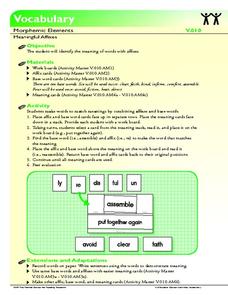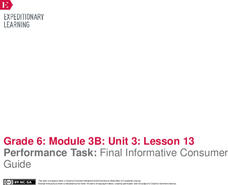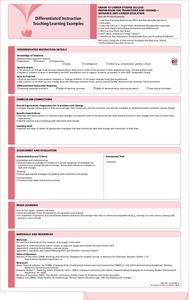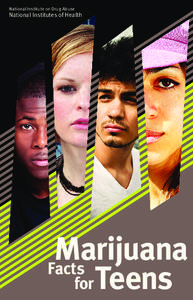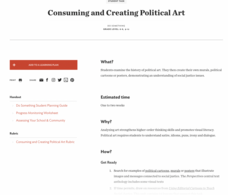Florida Center for Reading Research
Vocabulary: Morphemic Elements, Meaningful Affixes
Invite learners to determine which affix and base word combinations create new words. This activity allows pupils to play around and create words that match specific meanings.
Nemours KidsHealth
Stress: Grades 9-12
Everyone feels stress from time to time, but how can you move past it? A seven-page packet of activities guides high schoolers through the process of recognizing and managing their stress. The resource includes discussion topics, a quick...
Nosapo
Getting to Know Each Other
How do you do? Guide learners through the basics of conversational English with an extensive set of discussion questions. Class members ask partners more about themselves, including their favorite hobbies, music, and time of day, as well...
EngageNY
Performance Task: Final Informative Consumer Guide
Formative feedback should be kind, specific, and helpful. Pupils engage in a peer editing process, using a rubric to critique a partner's writing. Next, scholars use the feedback to create the final version of their informative consumer...
Curated OER
What is a Philanthropist?
What does a philanthropist do? Help your class explore philanthropy using character development and literacy ideas. Learners will define and give examples of philanthropy, listen to The Lion and the Mouse, discuss how the characters help...
Curated OER
A Walk to Remember by Nicholas Sparks
In this online interactive reading comprehension worksheet, students respond to 4 short answer and essay questions based on A Walk to Remember. Students may also access an online quiz on the selection using the link at the bottom of the...
Curated OER
Lewis and Clark
Students investigate Lewis and Clark. In this Lewis and Clark lesson, students search the Internet for information about Lewis and Clark and the Corps of Discovery. Students use maps to understand the explorations and decide which...
Missouri Department of Elementary
Don’t Tease Me!
A whole-class discussion sheds light on school bullying and ways to prevent it. Scholars share a moment when they observed or experienced some sort of teasing. Pupils brainstorm ways such behavior can be stopped or prevented.
Museum of Disability
Stand in My Shoes
Stand in My Shoes, a story by Bob Sornson, is an effective way to teach young learners about empathy and making friends. Once pupils read through the story, they answer a series of discussion questions and complete reading activities...
Missouri Department of Elementary
Ingredients of a Relationship Recipe
An eye-catching hook makes a smart analogy between ingredients for a food recipe and ingredients for quality relationships. Scholars discuss and list qualities they feel contribute to positive interactions. Pupils create a recipe card...
EduGAINs
Preparation for Transitions and Change— Guidance and Career Education
Every hopeful in your class has gone through some kind of life change, from parents' divorce to a death in the family to moving up into another grade. Encourage them to discuss these changes, the skills they used and acquired during...
Curated OER
Caring for Others - Interview Questions
A worksheet produced by the 4-H organization challenges youngsters to consider seven questions regarding caring for others. They must choose five of the questions, then interview one of their peers by asking them the five questions. One...
Health Smart Virginia
Making Partners
Partnering with someone new may be daunting. Here a lesson encourages young peers to work collaboratively in physical activity settings. Following a whole-class discussion, scholars participate in several cooperative activities that...
National Institute on Drug Abuse
Marijuana Facts for Teens
Is marijuana addictive? Can you drive under the influence of marijuana? What happens if you smoke marijuana while you're pregnant? Teenagers learn the answers to these and many more frequently asked questions in an online booklet about...
Novelinks
The Devil’s Arithmetic: Personal Narrative Assignment
How can an unfamiliar place help you learn something about yourself? Use a narrative writing prompt as you culminate your unit on Jane Yolen's The Devil's Arithmetic. Kids consider the ways that, like the main character from the novel,...
Bully Free Systems
Bully Free Lesson Plans—Fourth Grade
Two lessons detail what do if you are or see someone being bullied. The Four-Step STOP method features an assertive way to make school a bully-free zone. Tips offer advice to be a helpful bystander. A parent or guardian chat bridges the...
Council for the Curriculum, Examinations and Assessment
Self Concept
Reflect on your identity, the past events that helped you form your personality, and your future aspirations with a lesson about self concept. Eighth graders examine their own traits and the ways they are unique from their peers before...
Florida Center for Reading Research
Vocabulary: Morphemic Elements, Rooting for Meaning!
Scholars work with root and meaning cards to build vocabulary skills. Playing with a partner, learners read a root, locate its meaning, and cover it with a counter. The first player to cover their board wins.
Teaching Tolerance
Consuming and Creating Political Art
A picture is worth a thousand words, but political art may be worth even more! After examining examples of political cartoons, murals, and other forms of public art, class members create their own pieces to reflect their ideals and...
Equality and Human Rights Commission
Learning area 1: Who am I?
Five activities encourage scholars to dream big and celebrate the similarities and differences of those around them. Learners take part in two active practices that showcase how their peers are the same and different. Worksheets...
Bully Free Systems
Bully Free Lesson Plans—Seventh Grade
Having a hard time defining bullying with your seventh graders? Discuss the different types of behavior one would see in a bullying situation with a series of lessons, worksheets, and group activities.
Curated OER
Are You an Optimist or a Pessimist?
Listening is a skill. This lesson plan will provide your pupils with clear guidelines for what to do when someone else is speaking. Whether you ask them to note key words in a talk, to prepare two questions about the presentation, or to...
Curated OER
Words Will Break Your Heart
Learners practice being kind. In this character education activity, students identify hurtful words they have heard and then share kind words they have heard. Learners discuss the impact of hurtful words.
Curated OER
Once Upon a Time: Writing Stories about Reading
Students read a New York Times article to examine strong first person voice in essays about reading. They write their own first person essays about some aspect of reading, participate in peer review, and re-writing.


